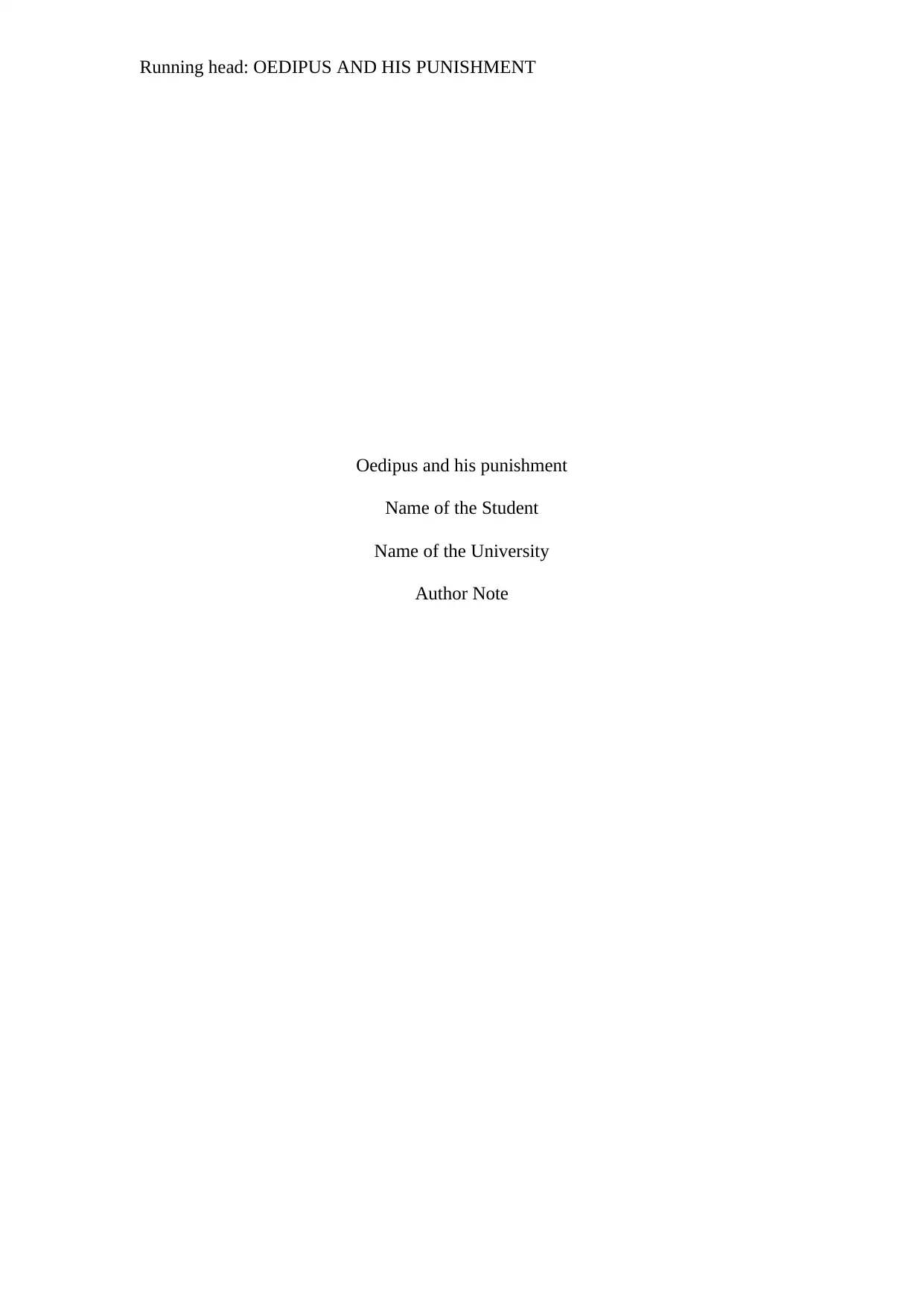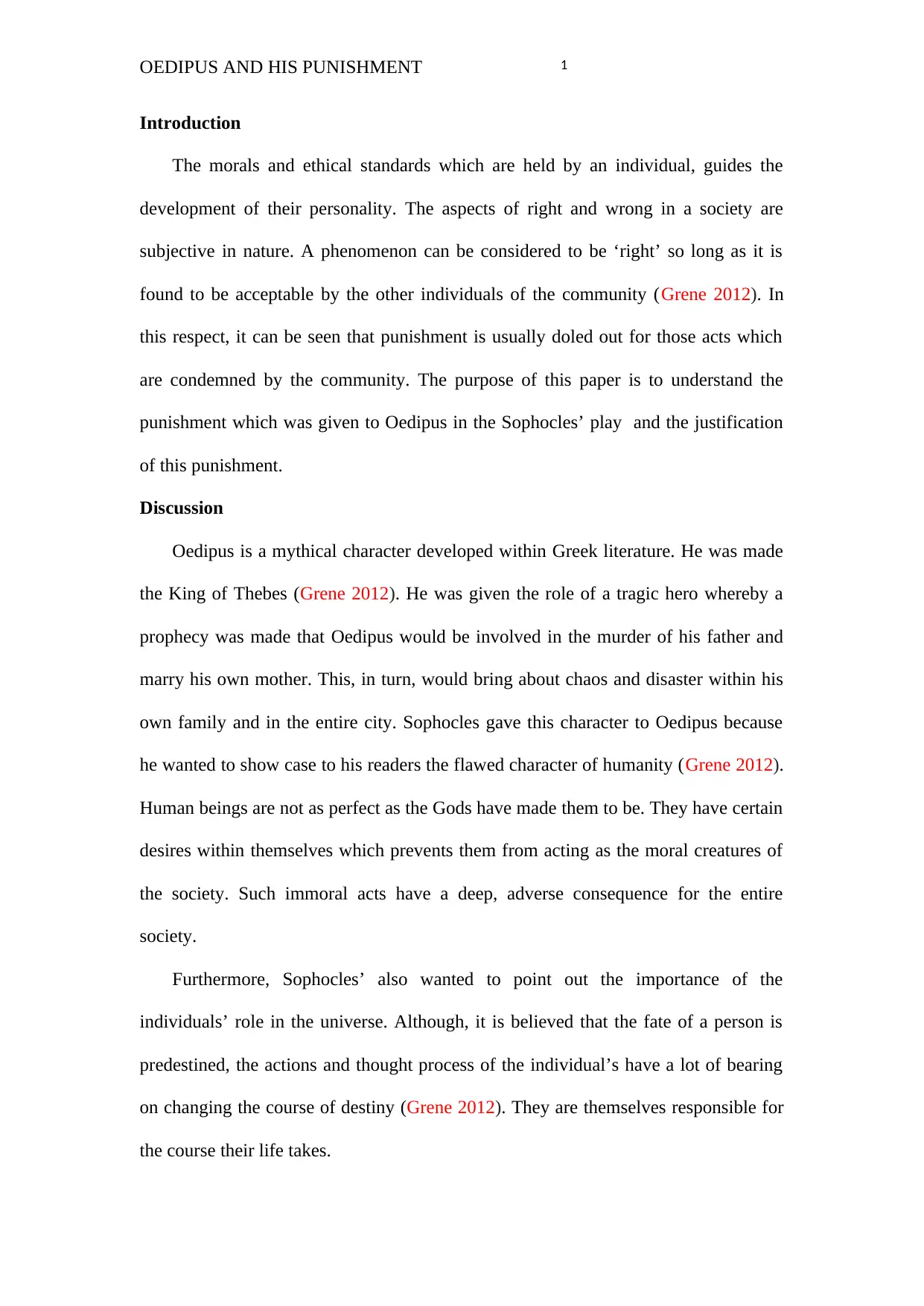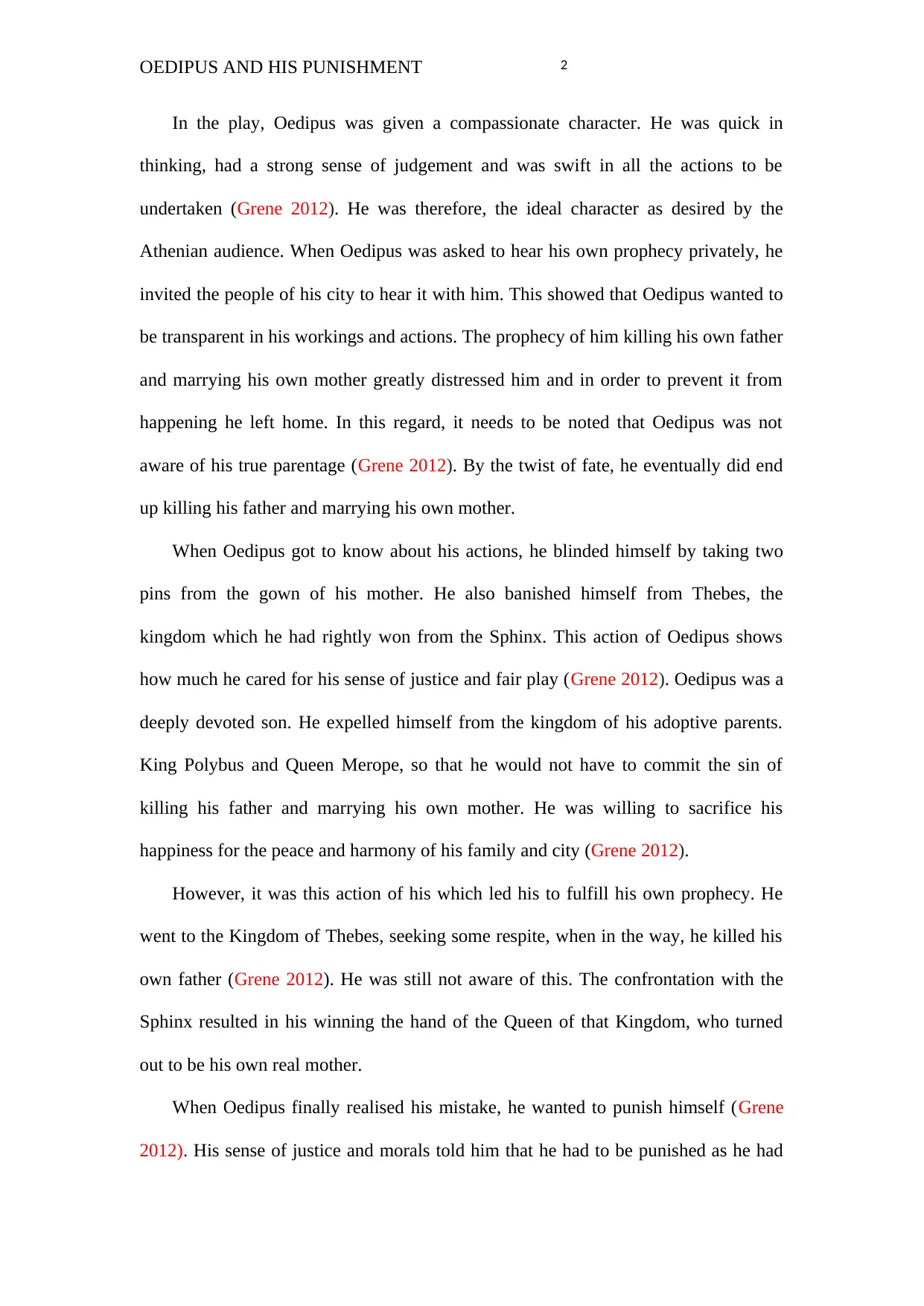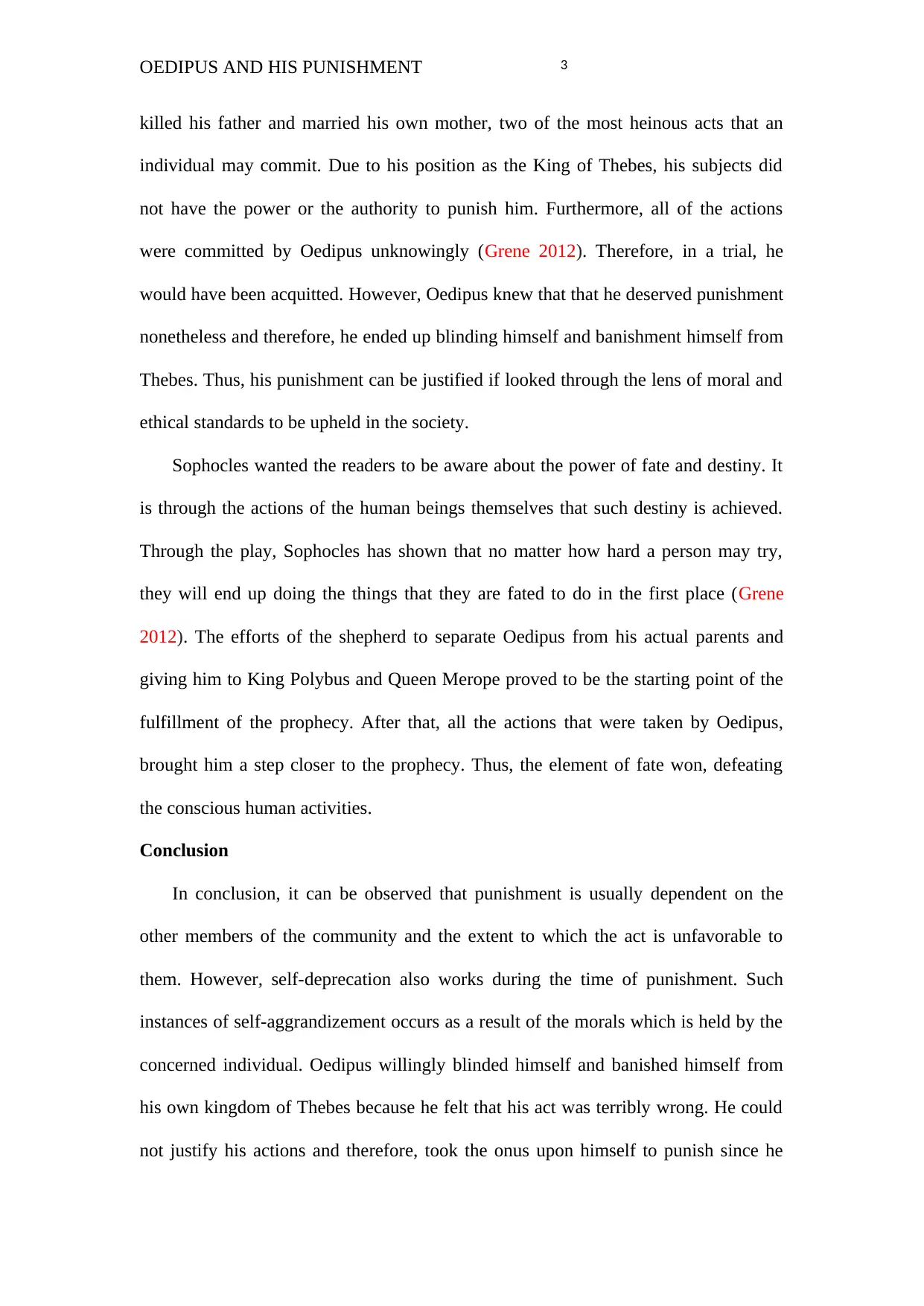Oedipus and His Punishment
VerifiedAdded on 2022/08/16
|6
|1166
|15
AI Summary
Contribute Materials
Your contribution can guide someone’s learning journey. Share your
documents today.

Running head: OEDIPUS AND HIS PUNISHMENT
Oedipus and his punishment
Name of the Student
Name of the University
Author Note
Oedipus and his punishment
Name of the Student
Name of the University
Author Note
Secure Best Marks with AI Grader
Need help grading? Try our AI Grader for instant feedback on your assignments.

1OEDIPUS AND HIS PUNISHMENT
Introduction
The morals and ethical standards which are held by an individual, guides the
development of their personality. The aspects of right and wrong in a society are
subjective in nature. A phenomenon can be considered to be ‘right’ so long as it is
found to be acceptable by the other individuals of the community (Grene 2012). In
this respect, it can be seen that punishment is usually doled out for those acts which
are condemned by the community. The purpose of this paper is to understand the
punishment which was given to Oedipus in the Sophocles’ play and the justification
of this punishment.
Discussion
Oedipus is a mythical character developed within Greek literature. He was made
the King of Thebes (Grene 2012). He was given the role of a tragic hero whereby a
prophecy was made that Oedipus would be involved in the murder of his father and
marry his own mother. This, in turn, would bring about chaos and disaster within his
own family and in the entire city. Sophocles gave this character to Oedipus because
he wanted to show case to his readers the flawed character of humanity (Grene 2012).
Human beings are not as perfect as the Gods have made them to be. They have certain
desires within themselves which prevents them from acting as the moral creatures of
the society. Such immoral acts have a deep, adverse consequence for the entire
society.
Furthermore, Sophocles’ also wanted to point out the importance of the
individuals’ role in the universe. Although, it is believed that the fate of a person is
predestined, the actions and thought process of the individual’s have a lot of bearing
on changing the course of destiny (Grene 2012). They are themselves responsible for
the course their life takes.
Introduction
The morals and ethical standards which are held by an individual, guides the
development of their personality. The aspects of right and wrong in a society are
subjective in nature. A phenomenon can be considered to be ‘right’ so long as it is
found to be acceptable by the other individuals of the community (Grene 2012). In
this respect, it can be seen that punishment is usually doled out for those acts which
are condemned by the community. The purpose of this paper is to understand the
punishment which was given to Oedipus in the Sophocles’ play and the justification
of this punishment.
Discussion
Oedipus is a mythical character developed within Greek literature. He was made
the King of Thebes (Grene 2012). He was given the role of a tragic hero whereby a
prophecy was made that Oedipus would be involved in the murder of his father and
marry his own mother. This, in turn, would bring about chaos and disaster within his
own family and in the entire city. Sophocles gave this character to Oedipus because
he wanted to show case to his readers the flawed character of humanity (Grene 2012).
Human beings are not as perfect as the Gods have made them to be. They have certain
desires within themselves which prevents them from acting as the moral creatures of
the society. Such immoral acts have a deep, adverse consequence for the entire
society.
Furthermore, Sophocles’ also wanted to point out the importance of the
individuals’ role in the universe. Although, it is believed that the fate of a person is
predestined, the actions and thought process of the individual’s have a lot of bearing
on changing the course of destiny (Grene 2012). They are themselves responsible for
the course their life takes.

2OEDIPUS AND HIS PUNISHMENT
In the play, Oedipus was given a compassionate character. He was quick in
thinking, had a strong sense of judgement and was swift in all the actions to be
undertaken (Grene 2012). He was therefore, the ideal character as desired by the
Athenian audience. When Oedipus was asked to hear his own prophecy privately, he
invited the people of his city to hear it with him. This showed that Oedipus wanted to
be transparent in his workings and actions. The prophecy of him killing his own father
and marrying his own mother greatly distressed him and in order to prevent it from
happening he left home. In this regard, it needs to be noted that Oedipus was not
aware of his true parentage (Grene 2012). By the twist of fate, he eventually did end
up killing his father and marrying his own mother.
When Oedipus got to know about his actions, he blinded himself by taking two
pins from the gown of his mother. He also banished himself from Thebes, the
kingdom which he had rightly won from the Sphinx. This action of Oedipus shows
how much he cared for his sense of justice and fair play (Grene 2012). Oedipus was a
deeply devoted son. He expelled himself from the kingdom of his adoptive parents.
King Polybus and Queen Merope, so that he would not have to commit the sin of
killing his father and marrying his own mother. He was willing to sacrifice his
happiness for the peace and harmony of his family and city (Grene 2012).
However, it was this action of his which led his to fulfill his own prophecy. He
went to the Kingdom of Thebes, seeking some respite, when in the way, he killed his
own father (Grene 2012). He was still not aware of this. The confrontation with the
Sphinx resulted in his winning the hand of the Queen of that Kingdom, who turned
out to be his own real mother.
When Oedipus finally realised his mistake, he wanted to punish himself (Grene
2012). His sense of justice and morals told him that he had to be punished as he had
In the play, Oedipus was given a compassionate character. He was quick in
thinking, had a strong sense of judgement and was swift in all the actions to be
undertaken (Grene 2012). He was therefore, the ideal character as desired by the
Athenian audience. When Oedipus was asked to hear his own prophecy privately, he
invited the people of his city to hear it with him. This showed that Oedipus wanted to
be transparent in his workings and actions. The prophecy of him killing his own father
and marrying his own mother greatly distressed him and in order to prevent it from
happening he left home. In this regard, it needs to be noted that Oedipus was not
aware of his true parentage (Grene 2012). By the twist of fate, he eventually did end
up killing his father and marrying his own mother.
When Oedipus got to know about his actions, he blinded himself by taking two
pins from the gown of his mother. He also banished himself from Thebes, the
kingdom which he had rightly won from the Sphinx. This action of Oedipus shows
how much he cared for his sense of justice and fair play (Grene 2012). Oedipus was a
deeply devoted son. He expelled himself from the kingdom of his adoptive parents.
King Polybus and Queen Merope, so that he would not have to commit the sin of
killing his father and marrying his own mother. He was willing to sacrifice his
happiness for the peace and harmony of his family and city (Grene 2012).
However, it was this action of his which led his to fulfill his own prophecy. He
went to the Kingdom of Thebes, seeking some respite, when in the way, he killed his
own father (Grene 2012). He was still not aware of this. The confrontation with the
Sphinx resulted in his winning the hand of the Queen of that Kingdom, who turned
out to be his own real mother.
When Oedipus finally realised his mistake, he wanted to punish himself (Grene
2012). His sense of justice and morals told him that he had to be punished as he had

3OEDIPUS AND HIS PUNISHMENT
killed his father and married his own mother, two of the most heinous acts that an
individual may commit. Due to his position as the King of Thebes, his subjects did
not have the power or the authority to punish him. Furthermore, all of the actions
were committed by Oedipus unknowingly (Grene 2012). Therefore, in a trial, he
would have been acquitted. However, Oedipus knew that that he deserved punishment
nonetheless and therefore, he ended up blinding himself and banishment himself from
Thebes. Thus, his punishment can be justified if looked through the lens of moral and
ethical standards to be upheld in the society.
Sophocles wanted the readers to be aware about the power of fate and destiny. It
is through the actions of the human beings themselves that such destiny is achieved.
Through the play, Sophocles has shown that no matter how hard a person may try,
they will end up doing the things that they are fated to do in the first place (Grene
2012). The efforts of the shepherd to separate Oedipus from his actual parents and
giving him to King Polybus and Queen Merope proved to be the starting point of the
fulfillment of the prophecy. After that, all the actions that were taken by Oedipus,
brought him a step closer to the prophecy. Thus, the element of fate won, defeating
the conscious human activities.
Conclusion
In conclusion, it can be observed that punishment is usually dependent on the
other members of the community and the extent to which the act is unfavorable to
them. However, self-deprecation also works during the time of punishment. Such
instances of self-aggrandizement occurs as a result of the morals which is held by the
concerned individual. Oedipus willingly blinded himself and banished himself from
his own kingdom of Thebes because he felt that his act was terribly wrong. He could
not justify his actions and therefore, took the onus upon himself to punish since he
killed his father and married his own mother, two of the most heinous acts that an
individual may commit. Due to his position as the King of Thebes, his subjects did
not have the power or the authority to punish him. Furthermore, all of the actions
were committed by Oedipus unknowingly (Grene 2012). Therefore, in a trial, he
would have been acquitted. However, Oedipus knew that that he deserved punishment
nonetheless and therefore, he ended up blinding himself and banishment himself from
Thebes. Thus, his punishment can be justified if looked through the lens of moral and
ethical standards to be upheld in the society.
Sophocles wanted the readers to be aware about the power of fate and destiny. It
is through the actions of the human beings themselves that such destiny is achieved.
Through the play, Sophocles has shown that no matter how hard a person may try,
they will end up doing the things that they are fated to do in the first place (Grene
2012). The efforts of the shepherd to separate Oedipus from his actual parents and
giving him to King Polybus and Queen Merope proved to be the starting point of the
fulfillment of the prophecy. After that, all the actions that were taken by Oedipus,
brought him a step closer to the prophecy. Thus, the element of fate won, defeating
the conscious human activities.
Conclusion
In conclusion, it can be observed that punishment is usually dependent on the
other members of the community and the extent to which the act is unfavorable to
them. However, self-deprecation also works during the time of punishment. Such
instances of self-aggrandizement occurs as a result of the morals which is held by the
concerned individual. Oedipus willingly blinded himself and banished himself from
his own kingdom of Thebes because he felt that his act was terribly wrong. He could
not justify his actions and therefore, took the onus upon himself to punish since he
Secure Best Marks with AI Grader
Need help grading? Try our AI Grader for instant feedback on your assignments.

4OEDIPUS AND HIS PUNISHMENT
believed that his subjects would show leniency on account of his being the King.
believed that his subjects would show leniency on account of his being the King.

5OEDIPUS AND HIS PUNISHMENT
References:
Grene, David. Oedipus the King. University of Chicago Press, 2012.
References:
Grene, David. Oedipus the King. University of Chicago Press, 2012.
1 out of 6
Related Documents
Your All-in-One AI-Powered Toolkit for Academic Success.
+13062052269
info@desklib.com
Available 24*7 on WhatsApp / Email
![[object Object]](/_next/static/media/star-bottom.7253800d.svg)
Unlock your academic potential
© 2024 | Zucol Services PVT LTD | All rights reserved.





